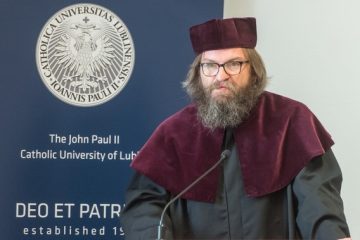Putin’s historiosophy and the Russian Church

Marcin Skladanowski,
PhD, Dr habil., Professor of Russian religion and society,
John Paul II Catholic University of Lublin,
Poland
Independent Researcher in the field of international security studies,
War Studies University,
Warsaw,
Poland
In Vladimir Putin’s public statements after 2014, we can see the increasing significance of historiosophic messaging. In the Russian media, Putin is portrayed as an expert on history. This picture is not disturbed by the errors he makes regarding historical facts. What is more important is that Putin presents not so much a specific vision of Russian history but rather a historiosophic concept. Historiosophy should be understood here as an ideological interpretation of historical events which gives them a timeless meaning. The best example of such thinking is using the history of World War II to construct the image of Russia as a victorious and heroic country that resists pressure from the West.
Putin’s main historiosophic thesis
Although Putin’s numerous speeches contain a historiosophic layer, those which serve to justify Russia’s imperial policy towards Ukraine are worth noting, because they coincide with the ideology that inspires the Patriarchate of Moscow. The central axis of Putin’s historiosophic message is the premise of the cultural and ethnic unity of Russia, Ukraine, and Belarus, which formed the historical Rus’. In 2016, this thesis resonated in his speech at the unveiling of a monument to Prince Vladimir of Kyiv in Moscow, and it has recurred in Putin’s many statements on the Russian-Ukrainian conflict following the annexation of Crimea. It was most clearly presented in Putin’s article ‘On the historical unity of the Russians and Ukrainians’, posted on 12 July 2021 on the official website of the Kremlin. According to President Putin, the Rus’ preserved its uninterrupted political and cultural existence with the basis of its political identity being the statehood built by Moscow (as the only historical heir of the Kievan Rus’) and the foundation of its cultural unity being the Orthodox Church.
What purpose do the historiosophic statements serve?
There is no need to find errors in Putin’s statements devoted to history because these are historiosophic texts – that is, they are ideological in principle. Concerning Russian society, they strengthen the belief in Russia’s uniqueness and its divergence from the West. The Russian state’s symbiosis with the Orthodox Church is emphasised, but it is not a symbiosis of two autonomous subjects, as the state retains priority.
However, the statements regarding Russia’s relations with Ukraine not only contain the conviction of the cultural unity of the Rus’ peoples but also – by presenting Russia as the only continuator of the Kievan Rus’ – lead to the negation of Ukrainian statehood. Consequently, the theses about cultural and linguistic unity aim to undermine the ethnic uniqueness of the Ukrainians. Finally, they are an ideological justification for actions interpreted as the mission of ‘gathering the Rus’ lands’ being completed by Putin. This mission is impossible without questioning the state sovereignty and ethnic and cultural separateness of Ukraine.
The ideology of the Patriarchate of Moscow
The activities of the Patriarchate of Moscow reflect the main thesis of Putin’s historiosophy. Regarding Ukraine, the Patriarchate opposes any attempt to restore ecclesiastical independence, referring to the tradition of the Kievan Orthodoxy. This is why efforts to establish an independent Orthodox Church of Ukraine, as acknowledged by world Orthodoxy, met with aggressive reactions from the Patriarchate, which continues to advance the notion that the only authentic Orthodox Church in Ukraine is the Moscow Church. This position caused a rupture in relations with the Patriarch of Constantinople, who granted the Orthodox Church of Ukraine a ‘tomos’ of autocephaly in 2019, and a condemnation of Patriarch Bartholomew’s visit to Ukraine in 2021, which Moscow Patriarch Kirill described as a ‘sin’.
The policy of the Patriarchate as a potential model for implementing Putin’s historiosophy
Historiosophy is entirely dependent on ideology and inspired by ideological objectives. For this reason, it cannot be limited to interpreting historical events, but tries to reveal their modern meaning and be inspired by them. When analysing Putin’s historiosophic theses and the activity of the Patriarchate of Moscow concerning Ukraine, a fundamental convergence can be discerned. This convergence is manifested in the questioning of Ukraine’s ability to develop without Russia. It leads to the conviction that the only political centre of the Rus’ is Russia and the only religious entity ensuring the Rus’ cultural identity is the Moscow Church.
This does not mean that this vision of integration with Russia precludes any form of autonomy. It does mean, however, that the condition of such autonomy is the acknowledgement of Russia’s primacy. From Putin’s historiosophic concept stems just such a vision of the integration of Rus’ lands, which the Moscow Patriarchate is already trying to implement in Ukraine and Belarus.
Email: marcin.skladanowski@kul.pl
Expert article 3081
> Back to Baltic Rim Economies 4/2021
To receive the Baltic Rim Economies review free of charge, you may register to the mailing list.
The review is published 4-6 times a year.
